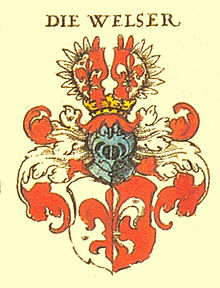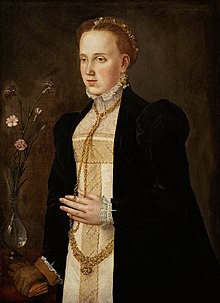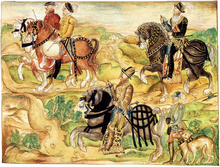Welser Family
The Welsers were a banking family from Augsburg, Germany, and one of Europe's leading financial houses in the first half of the century XVI.
History
The four Welser brothers Bartholomew (1488-1561), Lucas, Ulrice and Jacobo, managed the company that their father, Anton Welser, a successful merchant from Augsburg, had established in 1476 for the exploitation of silver mines in Europe central, the trade in Flemish textiles, English wool and oriental products. They expanded their business with factories in Flanders, Venice, Portugal and Spain.
In 1517 differences arose between the family members and the majority settled in Nuremberg, only Bartholomew Welser remaining in Augsburg. After the death of Maximilian I of Habsburg, Holy Roman Emperor, it will be he, along with the Fugger family and other Genoese bankers, who provided the necessary money to obtain the vote of the German Electors and achieve the imperial coronation of the king Carlos I of Spain in 1519, to the detriment of the other claimant, Francisco I of France. It was a group of representatives from the banking house of the Welser family from Augsburg, Germany. On March 28, 1528, King Carlos I issued the Capitulation of Madrid, temporarily leasing the province of Venezuela to the Welser family of German bankers from Augsburg, which led to the creation of the Klein-Venedig or Welserland, being the first non-Latin Europeans but Germanic who began the colonizing process in America.
The capitulation stipulated that said territories be ceded to the Welser family for their exploitation, with the condition of founding cities in the interior of the territory, distributing land, evangelizing the Indians and, in general, exercising government and help Spain to organize the new territories. The first governor was Ambrosius Ehinger (or Alfinger), who used the island of Hispaniola as his base, where the Welsers had founded two cities and three fortifications. From there Alfinger began his expedition in 1529, arrived at the colony of Santa Ana de Coro on February 24, explored the shores of Lake Maracaibo and founded the city of the same name. Alfinger died in 1533, assassinated by the Indians. Alfinger will be succeeded as governors and explorers of their territories in Venezuela by other Germans, such as Nicolás Federmann, Bartholomä Sayler, Georg von Speyer (or Jorge de Spira), Heinrich Remboldt, Philipp von Hutten and Bartholomeus Welser, who traveled the western basin of the Orinoco, Los Llanos and the northern Andes reaching the savannah of Santa Fe de Bogotá (present-day Colombia) in the case of Federmann.
Since Emperor Charles V opened the possibility in 1525 for foreigners to establish themselves in America under the same conditions as the Spanish, German financiers decided to take advantage of the opportunity to do business in the New World. Among the first to venture, the Welser family stands out, opening a factory in Santo Domingo and exploiting silver mines in Mexico. As part of the payment of a debt, on March 28, 1528, they obtained from Emperor Carlos V the exclusivity for the conquest and colonization of the territory between Cabo de la Vela (present-day Colombia) and Maracapana (present-day Venezuela), the so-called Province of Venezuela, being the first non-Latin Europeans who started the colonization process in America. The first governor of these inhospitable territories was the German Ambrosio Ehinger (or Alfinger), who used the island of Hispaniola as his base, where the Welsers had founded two cities and three fortifications. From there Alfinger began his expedition in 1529, arrived at Santa Ana de Coro, explored the shores of Lake Maracaibo and founded the city of Nueva Nuremberg (today Maracaibo). Alfinger died in 1533, assassinated by the Chitareros Indians. Alfinger will be succeeded as governors and explorers of their territories in Venezuela by other Germans, such as Nicolás Federmann, Georg Hohermut von Speyer and Philipp von Hutten, who entered the western basin of the Orinoco, Los Llanos and the Andes mountain range, reaching the plain of Santa Fe de Bogotá in the case of Federmann.
El Dorado represented the main interest of the Welser family, as well as finding the South Sea (Strait of Magellan), but their exploratory efforts were not successful in finding any of them, but they did point the way for the future conquest from Venezuelan territory.
After repeated unsuccessful attempts by the governors sent by the Welsers to establish a stable government in their territories, the discontent of the Castilians who inhabited Coro and accusations of various kinds, the Council of the Indies withdrew the concession to the Welsers in 1546 for breach of the lease, which included the founding of several cities, several forts and the obligation to spread Christianity among the natives. The fact of their ambiguous position in the religious sphere, being suspected of supporting the Lutheranism movement in Augsburg, may also have had an influence on this, which made them gain many enemies at Court and deteriorated their relations with the Habsburgs. In 1556 with the bankruptcy of the Spanish Treasury decreed by Felipe II that affected the Fuggers, but to a greater extent the Welsers and the Genoese, a decline began in the family's financial activities. In 1614, at the dawn of the Thirty Years' War, the House of Welser was declared bankrupt resulting in Matthias Welser being imprisoned and all trace of his archives lost.
In the framework of the Celebration of the 492 years of the founding of the city of Maracaibo, the transfer of the funeral remains and cenotaphs of Ambrosio Alfinger, which were located in the municipality of Chinácota, department of northern Santander of the Republic of Colombia and were transferred to be buried at El Cuadrado Grafen von Luxburg Fursten zu Carolath-Beuthen und Prinzen von Schoenaich-Carolath Cemetery, the short name El Cuadrado Luxburg-Carolath in the City of Maracaibo Zulia State of the Bolivarian Republic of Venezuela The act of transfer that was carried out under the name of “OUR DEPARTED LIVE-AMBROCIO ALFINGER”. This project was carried out jointly between the Colombian Catholic Churches and the Grafen von Luxburg Fursten zu Carolath-Beuthen und Prinzen von Schoenaich-Carolath Foundation.[1]
During the celebration of the Ecclesiastical Act in memory of the souls of those who died during the conquest and colonization of the American continent as a reconciliation act between the original natives and the Europeans, the mass was held for the first time in history in the Basilica of Our Lady of Chiquinquirá, and later the funeral and cenotaphic ecclesiastical relics of Ambrosio Alfinger were taken to the resting place in El Cuadrado Luxburg-Carolath Cemetery. The corresponding funeral protocols were carried out according to the regulations in the Bolívar prefecture of the city of Maracaibo.
Ambrosio Alfinger, governor and captain general of the province of Venezuela and as such would found the first Maracaibo with the name Neu-Nürnberg on September 8, 1529.
Contenido relacionado
Continental Airlines
Classical music
Carlos Eugenio Restrepo


